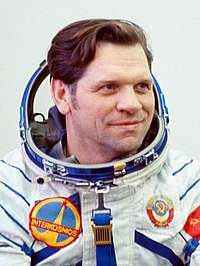Alexei Alexandrovich Gubarev
| Alexei Alexandrovich Gubarev | |
|---|---|

|
|
| Country: | USSR |
| Call sign: | ЗЕНИТ ( zenith ) |
| selected on | January 8, 1963 |
| Calls: | 2 space flights |
| Start of the first space flight: |
January 10, 1975 |
| Landing of the last space flight: |
March 10, 1978 |
| Time in space: | 37 d 11 h 36 min |
| retired on | September 1, 1981 |
| Space flights | |
Alexei Alexandrowitsch Gubarew ( Russian Алексей Александрович Губарев ; born March 29, 1931 in Gwardejzy , Kuibyshev Oblast , Russian SFSR ; † February 21, 2015 ) was a Soviet cosmonaut . Gubarev left school in 1950 and joined the Red Army. After completing his pilot training in 1952, he flew missions in the Korean War . In 1961 he successfully graduated from the Monino Air Force Academy and was then leader of a squadron on the Black Sea .
Astronaut activity

Training and initial assignments
In February 1962 Gubarev applied as a cosmonaut and underwent the necessary examinations, in January 1963 his application was accepted. He formed the second military cosmonaut group with 14 other military pilots.
Gubarev received basic training from January 1963 to January 23, 1965. Between September 1966 and January 1968, Gubarev was trained for the planned military spaceship Soyuz VI . Boris Belousov was assigned to him as the flight engineer . The project was later canceled.
From 1969 to February 1971 Gubarew was trained as a Soyuz commander in the "contact program". Vladimir Fartuschni was assigned to him as a flight engineer .
Training as a space station commander
From February 1971 Gubarev was trained as a commander of the Salyut 1 space station . Together with Vitaly Sevastyanov and Anatoly Voronov , he should have formed the third team. However, following the death of the Soyuz 11 crew in June 1971, further flights were suspended.
After that, Gubarev was trained as the commander of the next Salyut space station. Since the crew of the Soyuz spaceships was reduced from three to two cosmonauts, the previous crews were disbanded and Gubarev was assigned Georgi Grechko as flight engineer . Gubarew and Grechko were planned as the third crew, but were not used because the space station exploded in July 1972 when it was launched.
Another Salyut space station was launched in May 1973, but could not be manned due to technical problems. The next manned flight of the Soyuz spacecraft took place in September 1973 without a space station as a target. Gubarew and Grechko formed the substitute team for Soyuz 12 .
First space flight to Salyut 4
From December 1973 Gubarev and Grechko were trained for the Salyut 4 space station . The launch of the Soyuz 17 spaceship with Gubarev and Grechko on board took place on January 10, 1975. Gubarev had chosen "Zenit" as the call sign. For four weeks, Grechko and Gubarev lived and worked on board the space station. With a flight duration of 29 days, a new Soviet long-term record was set. In contrast, the Americans had spent almost three months in a space station with Skylab 4 .
Second space flight to Salyut 6
Starting in December 1976, Gubarev was preparing for the Interkosmos program, in which the Soviet Union made it possible for pilots from other nations to fly into space. Gubarew was assigned to Vladimír Remek from Czechoslovakia . Their Soyuz 28 flight in March 1978 was the first to have a spaceman on board who was not from the Soviet Union or the United States. Gubarew and Remek docked with the Salyut 6 space station and spent a week there as a visiting team for the regular crew of Yuri Romanenko and Georgi Grechko .
further activities
Meanwhile major general of the Soviet naval fleet, Alexei Gubarew retired from the cosmonaut corps on September 1, 1981. Then he was general manager of a transport company.
Gubarev wrote two books and 16 scientific articles. He earned a doctorate.
Private
Gubarev was married and had two children. He died on February 21, 2015.
Honors (selection)
- Double Order of Lenin (February 12, 1975 and March 16, 1978)
- Two Times Hero of the Soviet Union (February 12, 1975 and March 16, 1978)
- Aviation cosmonaut of the Soviet Union
- Winner of the Ziolkowski Medal (1978)
- Hero of the Czechoslovak Republic
- Honorary citizen of the Soviet cities Kaluga , Arkalyk and Tselinograd as well as Prague
- Namesake of the asteroid 2544 Gubarev
See also
Works
- Притяжение невесомости (The Attraction of Weightlessness), Sowremenik Publishing House, 1982
- Орбита жизни (Orbit of Life), Junge Garde Publishing House, 1990
literature
- Peter Stache: spaceman from A to Z . Military publishing house of the German Democratic Republic , Berlin [East] 1988, ISBN 3-327-00527-3 .
Web links
- Short biography on spacefacts.de
- Obituary on the website of the Yuri Gagarin Cosmonaut Training Center
- Космическая энциклопедия ASTROnote: Алексей Александрович Губарев (Russian)
- Alexei Alexandrowitsch Gubarew in the Encyclopedia Astronautica (English)
Individual evidence
- ↑ Позывные экипажей советских / российских космических кораблей. Космическая энциклопедия ASTROnote, May 11, 2015, accessed May 27, 2015 (Russian).
- ↑ Космонавт Алексей Губарев скончался на 84-м году жизни. Report on the homepage of the RBC media group from February 24, 2015 (Russian, accessed February 24, 2015).
| personal data | |
|---|---|
| SURNAME | Gubarew, Alexei Alexandrovich |
| ALTERNATIVE NAMES | Губарев, Алексей Александрович; Gubarew, Alexei Alexandrovich |
| BRIEF DESCRIPTION | soviet cosmonaut |
| DATE OF BIRTH | March 29, 1931 |
| PLACE OF BIRTH | Gwardejzy bei Kuibyshev , Russian SFSR |
| DATE OF DEATH | February 21, 2015 |